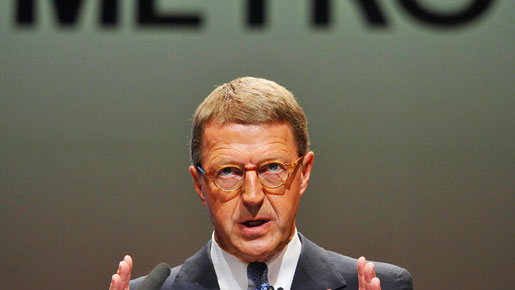
Eckhard Cordes, 56, has served as Metro AG’s CEO since November 2007. With a background in the automobile industry, Cordes is now applying his business know-how to retail, spanning department stores, cash and carry outlets and electronics. As the head of one of Germany’s largest multinationals – operating in 2,100 locations across 33 countries and employing 280,000 staff – he is in charge of quite a venture.
As befits a man at the creative helm of a company of such proportions, the Düsseldorf-based CEO exudes practicality and displays not a trace of the pompous antics that would almost be expected from an individual of his rank. In terms of work ethics, Cordes has adopted a responsible approach while at the same time being strategic and commercially driven. “Transparency, reliability and trust are major drivers for creating value. Investor relations manifests these values in its dialogue with the capital market. Therefore investor relations for us is an integral and significant part of our strategy,” Cordes stated soon after having taken over the Metro AG throne.
A fight for supremacy
When joining the retail group, the man with the Mercedes Benz pedigree made a vow to take Metro AG to new heights. To his advantage, he didn’t enter a shipwreck, although the company had faced tough competition from discount food retailers such as Aldi and Lidl.
Still, the company was in relatively good nick since his predecessor, Dr Hans-Joachim Körber, had managed to perform minor miracles during his tenure – he has been credited with turning Metro AG into one of the world’s leading retail players, while simultaneously turning the company into a driver in innovation for the entire international retail industry.
Rumour has it that Körber threw in the towel following disputes with Cordes, who spent 18 months in a senior role before being appointed CEO. Tensions between the Metro AG hotshots is said to have mounted over conflicting opinions on business strategy. Despite the fact that Cordes entered a venture with sound foundations – indeed, Metro AG is the world’s fourth-largest retailer measured by revenues – it hasn’t all been plain sailing as he stepped in the year before the recession hit. To fight the economic downturn, Cordes had to make sacrifices and face losses just like any other CEO.
The fickle fiscal pulse
With the financial crisis having eased its grip, Cordes took part in The World Economic Forum in January 2011 to take the opportunity to reflect on the past crisis as well as the risks that potentially lay ahead of us. “The main risks stem from the extreme degree of complexities in the market and the interconnectedness thereof. The last crisis we saw served as the perfect example, as it started in the private real estate sector in the US and then continued to spread to the rest of the world, seeing many banks go bankrupt and fold. This shows how interconnected the world is. Of course this also has benefits – we wouldn’t be where we are had it not been for the interconnectedness, but when problems arise, they’ll be harder to deal with.”
A mounting fear among industry leaders is the troubled eurozone and the rise of the debt-ridden state. These are issues that need urgent attention, in Corde’s opinion. “The high indebtedness of states poses a huge risk to the economy, and it is an issue that hasn’t been discussed enough. The question of the demographic development and the economic consequences that will stem from it is another important issue that must be addressed.”
Continued turbulence is never far from the minds of those at the top of the firm, and it may jeopardise the company’s growth. Indicatively, in March 2011 Metro AG’s shares slumped following an announcement stating that the global economic growth on which Metro AG had based its positive forecast may be curbed by Middle Eastern political turmoil and the Japanese earthquake. “Nobody can say at the moment how big the impact of the Japan disaster, the unrest in the Middle East and the weakness of some southern European countries will be on the global economy,” Cordes told reporters at the time.
Advancing the shopping empire
Despite ongoing market instability, Metro AG keeps evolving and is advancing in emerging markets such as China and India with considerable force and aims to invest wisely and beat competition from the likes of Tesco, which capitalises on the strength of the same territories.
“The BRIC countries are back on the scene – the western economy will continue to grow but not at the speed that the BRIC countries are progressing,” Cordes said at The World Economic Forum annual meeting. “We’re a globally active retailer and we operate locally. Emerging markets, such as Asia, Ukraine and Russia are the territories we are currently focusing on. We’ll still invest in Western Europe, but our cash investment is higher in these areas, or we wouldn’t be able to generate a sufficiently high growth rate.”
To mark his own words, Cordes anno-unced in August that Metro AG is set to open as many as 50 wholesale stores in the next five years in India – an expansion that would be as impressive as the company’s advance in China, where 50 more stores will spring up in the next five years.

